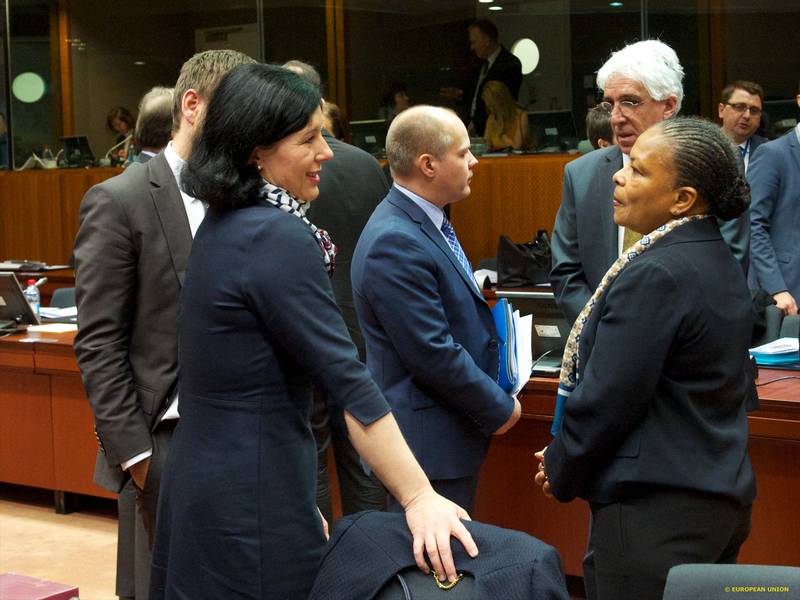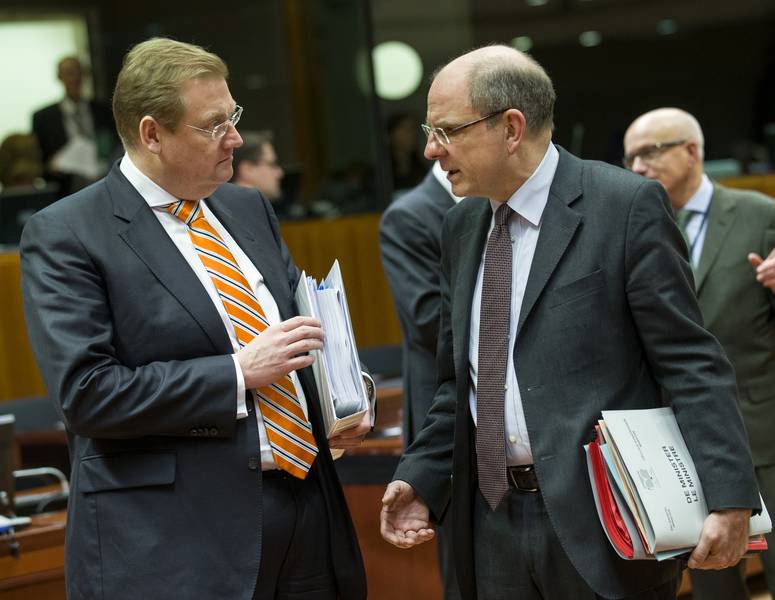European Prosecution With No Wings
Adelina Marini, December 4, 2015
 You should never count your chickens before they hatch and always measure EU integration by the creation of common institutions. In this sense, the ministers of justice of the EU made one more bad news for the supporters of more Europe. They came closer to an agreement on the proposal for a single European Prosecution's Office (EPPO) after trimming off most of its competences. This led to another series of drama reactions by the European Commission and several states, mainly Italy, who insisted on a strong supranational institution, whose competences are to be even expanded to cover terrorism and organised crime. Most member states, however, hailed the compromising text proposed by the Luxembourg presidency. The public session of the Council on December 3rd showed quite clearly which states prefer to keep their national competences and can thus be named eurosceptics – Austria, Finland, Portugal, Slovakia, Poland, Cyprus, Germany, Slovenia, Lithuania, Latvia, Hungary, Czech Republic, Great Britain, Croatia.
You should never count your chickens before they hatch and always measure EU integration by the creation of common institutions. In this sense, the ministers of justice of the EU made one more bad news for the supporters of more Europe. They came closer to an agreement on the proposal for a single European Prosecution's Office (EPPO) after trimming off most of its competences. This led to another series of drama reactions by the European Commission and several states, mainly Italy, who insisted on a strong supranational institution, whose competences are to be even expanded to cover terrorism and organised crime. Most member states, however, hailed the compromising text proposed by the Luxembourg presidency. The public session of the Council on December 3rd showed quite clearly which states prefer to keep their national competences and can thus be named eurosceptics – Austria, Finland, Portugal, Slovakia, Poland, Cyprus, Germany, Slovenia, Lithuania, Latvia, Hungary, Czech Republic, Great Britain, Croatia.
European Justice Commissioner Vĕra Jourová (Czech Republic, ALDE) shared her disappointment and said that the revised rules for the competences of the EPPO are moving in an unwanted direction. She feels the balance has been lost. Once more she urged the ministers to work for a strong, independent, and effective prosecution. There was, however, a feeling of acquiescence in her words. Quite the opposite feeling came from Italy Minister of Justice Andrea Orlando, who once again gave a strong and emotional speech, in which he expressed his disappointment. “I really wonder is this one of those institutes that is being created with a view to strengthening Europe, but actually ends up by weakening Europe”, he said, continuing his monologue from the previous meeting on October 8th. He said quite earnestly that he was not prepared to support something that weakens the role of the European Public Prosecutor's Office (EPPO). He feels that with the reached compromise the new institution will end up in a tug war between national legal systems.
He expressed confidence that if a weak EPPO were agreed on, this would undermine any future attempts to strengthen it. “We're surrounded by all sorts of challenges in the world today and with all these challenges ahead of us we shouldn’t back away from ambitious solutions”, he said and finished with the words that Italy is not happy with the proposal that was put on the table on December 3rd. French Minister of Justice Christiane Taubira agreed with her Italian colleague and reminded that France had been insisting from day one on a strong EPPO, which could investigate organised crime as well. She said that in today’s context it is important that terrorism be included in its competences as well. Despite her criticism, however, she said that France would in the end support the proposal with the hope that further on there will be a possibility for consolidation of the Prosecutor’s Office.
Spain was also critical but willing to back the compromise with the argument that this is probably the least bad of all possible texts under the current circumstances. According to Carmen Sánchez-Cortés Martín, State Secretary of Justice, the Council is headed to a much less ambitious solution, which is more and more national. “National authorities now can stifle EPPO by not offering it enough information even in cases which are very much in national competence. Their wings are being clipped”. Despite declared willingness to back the proposal, Spain has decided to wait and see “what other clippings will happen” and then will decide whether to participate at all in such a weak institution.
Romania was also unhappy with the proposed compromise, reminding that it supports a strong Prosecution. To get this a clear and ambitious text is needed. Romania was the only state to intercede in this sense for a dynamic reference to the currently discussed directive on fighting fraud concerning the EU’s financial interests (the PIF directive). Hungary, Great Britain, and Sweden asked that the reference is static. Great Britain was clearest as of why it requires a static reference, regardless of not planning to participate in the EPPO. James Brokenshire, Minister of Immigration, stated that a dynamic reference would give the European Parliament a far greater role in future decision-making on the work of the EPPO, while a static reference will protect the superiority of the Council regarding the Prosecution. Moreover, a dynamic reference could circumvent “important safeguards” in the treaties regarding any future scope of EPPO competence.
In other words, Great Britain wishes to exclude the European Parliament from the equation and guarantee that the EU will be legally blocked to extend the competence of the EPPO in any future moment, when an integration window opens. Belgian Minister of Justice Koen Geens was also very disappointed by the proposed texts. He stated it was very mildly put that the EPPO’s competence is watered down. Bulgaria Minister of Justice Hristo Ivanov backed his disappointed colleagues, but said he was going to go with the text anyway. Later, in front of journalists he clarified that negotiations are extremely difficult, for they are in practise a clash between the states, which are scared of a too powerful EPPO and the ones afraid it will be too weak. Andrea Orlando stated upon exiting the meeting last night that Italy had great expectations, but the member states chose the line of least resistance.
To most of the countries that made statements the situation is balanced. Lithuania, however, did not hide its pleasure at the “clipping” of the wings of the EPPO. Juozas Bernatonis, the Lithuanian Minister of Justice, welcomed the compromise in stating that finally the borders of competence of the EPPO are becoming clear. He feels the result is of high quality and balanced, having in mind the difficult times faced by member states at the moment. The Netherlands, which takes up the presidency from January 1st and promised it will work hard on finishing the work on this dossier, reminded that the Dutch  parliament is hostile towards the proposal, but it is finally moving “in the right direction”, said Ard van der Steur, Minister of Security and Justice.
parliament is hostile towards the proposal, but it is finally moving “in the right direction”, said Ard van der Steur, Minister of Security and Justice.
Despite the disappointment, there was good news as well. More and more member states accept that the EPPO should investigate VAT frauds as well. Commissioner Jourová underlined that she was adamant that VAT is included in the scope of the EPPO, for it is a financial interest of the Union and should be protected by European criminal law the same way as all other revenues in the European budget. There is still no agreement on this issue.
Translated by Stanimir Stoev
 Federica Mogherini | © Council of the EU
Federica Mogherini | © Council of the EU | © Council of the EU
| © Council of the EU Luis De Guindos | © Council of the EU
Luis De Guindos | © Council of the EU